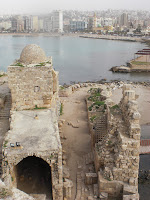Friday, 16 March 2012
Sunday, 4 March 2012
First Month: My Boots Weren't Made for Walking
I've now been here a month, enough time to give me an impression of life in Beirut. This is of course different to any impression Lebanese people have of their city as my different background gives me an altered perception. Furthermore I've spent the majority of my time in the central districts of Beirut where people are well-off and live comfortably - although brief meetings with the poorer Palestinians in and around the Cola Junction bus station, who are more curious and relatively poorly educated, have not changed my opinion.
Beirut is an incredibly easy city to exist in. I have never been singled out for being a foreigner. On the other hand, anytime I have approached someone to ask for help they have gone out of their way to assist me; for example the grocery store owner, who, when asked for directions to the art museum, immediately got his car and drove me and my friends there directly. Or the assistant in the shawarma shop in Baalbek who, when he didn't have change for a $100 note, ran off up the street with it to his mate in the Western Union shop who was able to break it up.
I have never heard anyone badmouthing or complaining about other nationalities, ethnic groups or religions which, given the brutal history of sectarian violence and outside interference in the country, is quite remarkable. Again I should add the disclaimer that I've not been in contact with all the various social groups, but I have been lucky enough to communicate in broken Arabic and English with taxi drivers of various religions (in cars in various states of disrepair) who have also given me this impression.
 In order to save space in my backpack I only brought one pair of everyday shoes, a pair of light-coloured Hummel trainers. Long walks up and down the Corniche and weaving in and out of traffic in the road and parked on the broken pavement, as well as an unexpectedly high amount of rain and cold weather, have all taken their toll on these, and they have now been replaced with a sturdy pair of brown shoes which set me back around £15 from a bustling marketplace under the flyover of one of the city's main highways (I also picked up a warm jumper for £1 here).
In order to save space in my backpack I only brought one pair of everyday shoes, a pair of light-coloured Hummel trainers. Long walks up and down the Corniche and weaving in and out of traffic in the road and parked on the broken pavement, as well as an unexpectedly high amount of rain and cold weather, have all taken their toll on these, and they have now been replaced with a sturdy pair of brown shoes which set me back around £15 from a bustling marketplace under the flyover of one of the city's main highways (I also picked up a warm jumper for £1 here).
On a personal note, the first weeks have been a headrush of new impressions, studying, sightseeing and new people which, while keeping life exciting every second of every day, can be hard to keep up with. I have discovered that I can survive on an average of 5 hours' sleep a night, on the other hand I have taken up drinking coffee. I also eat meat a couple of times a week only and could easily become a vegetarian if shawarma didn't taste so good - I have cooked meat at home once since I've been here.
One element of being a backpacker is that you often make fast-burning friendships with people whom you briefly share a hostel or some other space with before moving on. The same thing applies as an exchange student, but over a longer term, so that, at least to some extent, you make friends in a more real-life context - though a temporary one nonetheless. Three of the closest friends I have here all left on the 1st of March and two of my best friends from Aarhus arrived on the same day, as if to draw some kind of unwanted neat line under the first month. I am happy to be staying for the next three.
One of my Aarhusianske friends, Emily, who arrived in Beirut during the last week, has a blog with a different take and far better photos than I can hope to offer. See it here:
http://emilykatemerrick.tumblr.com/
Beirut is an incredibly easy city to exist in. I have never been singled out for being a foreigner. On the other hand, anytime I have approached someone to ask for help they have gone out of their way to assist me; for example the grocery store owner, who, when asked for directions to the art museum, immediately got his car and drove me and my friends there directly. Or the assistant in the shawarma shop in Baalbek who, when he didn't have change for a $100 note, ran off up the street with it to his mate in the Western Union shop who was able to break it up.
I have never heard anyone badmouthing or complaining about other nationalities, ethnic groups or religions which, given the brutal history of sectarian violence and outside interference in the country, is quite remarkable. Again I should add the disclaimer that I've not been in contact with all the various social groups, but I have been lucky enough to communicate in broken Arabic and English with taxi drivers of various religions (in cars in various states of disrepair) who have also given me this impression.
 In order to save space in my backpack I only brought one pair of everyday shoes, a pair of light-coloured Hummel trainers. Long walks up and down the Corniche and weaving in and out of traffic in the road and parked on the broken pavement, as well as an unexpectedly high amount of rain and cold weather, have all taken their toll on these, and they have now been replaced with a sturdy pair of brown shoes which set me back around £15 from a bustling marketplace under the flyover of one of the city's main highways (I also picked up a warm jumper for £1 here).
In order to save space in my backpack I only brought one pair of everyday shoes, a pair of light-coloured Hummel trainers. Long walks up and down the Corniche and weaving in and out of traffic in the road and parked on the broken pavement, as well as an unexpectedly high amount of rain and cold weather, have all taken their toll on these, and they have now been replaced with a sturdy pair of brown shoes which set me back around £15 from a bustling marketplace under the flyover of one of the city's main highways (I also picked up a warm jumper for £1 here).On a personal note, the first weeks have been a headrush of new impressions, studying, sightseeing and new people which, while keeping life exciting every second of every day, can be hard to keep up with. I have discovered that I can survive on an average of 5 hours' sleep a night, on the other hand I have taken up drinking coffee. I also eat meat a couple of times a week only and could easily become a vegetarian if shawarma didn't taste so good - I have cooked meat at home once since I've been here.
One element of being a backpacker is that you often make fast-burning friendships with people whom you briefly share a hostel or some other space with before moving on. The same thing applies as an exchange student, but over a longer term, so that, at least to some extent, you make friends in a more real-life context - though a temporary one nonetheless. Three of the closest friends I have here all left on the 1st of March and two of my best friends from Aarhus arrived on the same day, as if to draw some kind of unwanted neat line under the first month. I am happy to be staying for the next three.
One of my Aarhusianske friends, Emily, who arrived in Beirut during the last week, has a blog with a different take and far better photos than I can hope to offer. See it here:
http://emilykatemerrick.tumblr.com/
Ruins and Religion
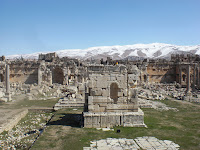 Baalbek, a small city with a population of around 80,000, lies in the northeast of Lebanon, roughly halfway between Beirut and Damascus on a plateau of just under 1000 metres in altitude. It is home to an archaeological site of jawdropping scale - a Roman temple complex originally known as Heliopolis, later converted to Christianity by the Romans themselves and finally passing into Arab and Ottoman hands and researched by German archaeologists during the 19th century.
Baalbek, a small city with a population of around 80,000, lies in the northeast of Lebanon, roughly halfway between Beirut and Damascus on a plateau of just under 1000 metres in altitude. It is home to an archaeological site of jawdropping scale - a Roman temple complex originally known as Heliopolis, later converted to Christianity by the Romans themselves and finally passing into Arab and Ottoman hands and researched by German archaeologists during the 19th century.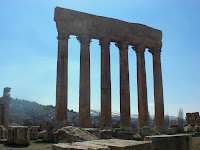 A sunny and warm Sunday in late February provided a good opportunity to see this ancient wonder. I took an early bus which headed up into the mountains where small patches of snow still littered the hills and a fine panorama of Beirut came into view just before the pass. Entering the city along the highroad provided two 'wow' moments - the 20 metre tall Roman columns coming into view behind the roadside bulidings, and a colourful and lavishly decorated mosque (not part of the archaeological site).
A sunny and warm Sunday in late February provided a good opportunity to see this ancient wonder. I took an early bus which headed up into the mountains where small patches of snow still littered the hills and a fine panorama of Beirut came into view just before the pass. Entering the city along the highroad provided two 'wow' moments - the 20 metre tall Roman columns coming into view behind the roadside bulidings, and a colourful and lavishly decorated mosque (not part of the archaeological site).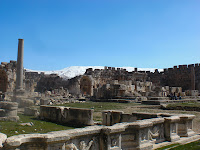 The group I joined for the day trip was shown around by a gentle man of around 70 who frequently referred to the 'crazy Romans'. He had excellent knowledge and impressed upon us the sheer scale of the site - for example, the 18x3x4 metre foundation stones at one end of the complex are the largest of their type ever built.
The group I joined for the day trip was shown around by a gentle man of around 70 who frequently referred to the 'crazy Romans'. He had excellent knowledge and impressed upon us the sheer scale of the site - for example, the 18x3x4 metre foundation stones at one end of the complex are the largest of their type ever built.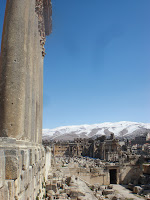 After seeing the ruins there was time to take a look around the city. The ubiquitous Lebanese ahlan or 'welcome' was heard often.We bought a falafel for 1000 Lebanese pounds (around 30p) and looked around the market. Here, I realised that I had left my backpack (which contained my passport) in the falafel shop. I hurried back there to find the shop owner and his assistant watching over my bag, grinning cheerfully as they returned it.
After seeing the ruins there was time to take a look around the city. The ubiquitous Lebanese ahlan or 'welcome' was heard often.We bought a falafel for 1000 Lebanese pounds (around 30p) and looked around the market. Here, I realised that I had left my backpack (which contained my passport) in the falafel shop. I hurried back there to find the shop owner and his assistant watching over my bag, grinning cheerfully as they returned it.Following this we visited the remarkable looking Blue Mosque. The Blue Mosque is a Shi'a mosque, as Baalbek is situated within a part of religiously heterogeneous Lebanon which is predominantly Shi'a Islam in denomination. This gives it a noticeably different feel to the (very) roughly half-Sunni, half-Christian Beirut. For those who are not familiar with the distribution of the two main branches of Islam (which for contextualisation can be very loosely compared to Catholic and Protestant Christianity in terms of how far apart they are ideologically), Sunnism is the one most prevalent in the Arabian peninsula, North Africa and Turkey as well as in Pakistan and India; while Shi'ism dominates Iran. The populations of Lebanon, Syria and Iraq are divided to varying extents between the two.
Going back to Baalbek, its Shi'a population has one particular significance in the Lebanese context - support for Hezbollah, the controversial, staunchly anti-Israel resistance organisation. I don't know nearly enough to be able to give a balanced description of Hezbollah's complex military and political history and present, but it has both supporters and opponents within Lebanon and, as its religion is Shi'ism, it is widely supported in Baalbek. This becomes obvious on the highway into the city where the characteristic yellow and green flag of Hezbollah flies from lamp posts beside posters of leader Hassan Nasrallah. Outside the relatively heavily-touristed ruins, touts hawk Hezbollah t-shirts and Palestinian neckerchiefs, in similar spirit to the Che Guevara t-shirts sold in Cuba (and everywhere else in the world), but somewhat more controversial to be seen wearing - it would be a naive or brave tourist indeed who would walk around Beirut displaying the Hezbollah logo.

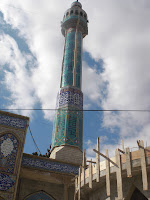
There is far more to Shi'ism in Baalbek though than support for Hezbollah. We were allowed to visit the mosque and look inside which was a fascinating experience. We walked among people praying and were able to observe the glittering and beautiful interior and a number of interesting differences from Sunni mosques, such as use of a prayer stone, said to come from the Battle of Karbala, and pictures of the prophet Mohammad, banned in Sunni Islam.
Saturday, 25 February 2012
Shawarmas at Sunset
During the last couple of weeks I've found time in my busy schedule to visit two historical cities outside of Beirut.
Saida, usually rendered in English as Sidon, is an hour's minibus journey (which costs just over $1) along a pleasant coast road to the south of Beirut. Cola Junction, the capital's hectic bus terminal, consists of buses parked on a roundabout underneath a large overpass with drivers and conductors approaching passers by to ask their destination and then helpfully pointing them in the right direction. Once this has been successfully navigated, the minibus edges its way through the traffic towards the southern outskirts of the city (where Hezbollah banners and posters of vilified Syrian president Bashar al-Assad and assassinated former Lebanese prime minister Rafik Hariri can all be spotted near to the road) before making it onto the open road.
 From here it is plain sailing to Saida, a small city with a much more oriental feel than glamorous central Beirut. The two main attractions in the town are its 13th-century Crusader-built castle on a small promontory in a natural harbour, and souk or traditional Arabic market. The castle, despite being right over the road from the souk, offers a calming solitude far from the din of Beirut's 'aj'at sir (traffic jams). There are very few tourists despite the impressive historical attractions on offer. I spoke to two other foreigners only - an Iraqi couple on their honeymoon who approached me to say hello.
From here it is plain sailing to Saida, a small city with a much more oriental feel than glamorous central Beirut. The two main attractions in the town are its 13th-century Crusader-built castle on a small promontory in a natural harbour, and souk or traditional Arabic market. The castle, despite being right over the road from the souk, offers a calming solitude far from the din of Beirut's 'aj'at sir (traffic jams). There are very few tourists despite the impressive historical attractions on offer. I spoke to two other foreigners only - an Iraqi couple on their honeymoon who approached me to say hello.The souq offers the kind of experience one might expect from a visit to a Middle Eastern country - narrow alleys, stray cats, the smell of food being cooked, handcrafted furniture and narghile pipes, and the heartachingly romantic sound of the call to prayer, seeping through the small gaps between the buildings from several mosques within the approximately 1 square mile area of the souq.
Byblos, also known as Jbair, lies a similar distance from Beirut to Saida, but to the north. It is arguably the world's oldest city, with evidence of settlement from as long ago as 5000 B.C.E. It has a much larger castle on a hilltop overlooking the coast all the way back to Beirut. Originally built by the Romans, the castle was appropriated successively by the Crusaders, Mamluks and Ottomans. It is still standing and is an impressive place evocative of any King Arthur story. More tourist-conscious than Saida, Byblos also boasts a slightly tacky 'mini-souq' of gift shops but does have a beautiful harbour where we sat and contemplated the sunset.
I will add pictures from Byblos (and the souq at Saida) at a later date - I didn't have my camera with me on the day.
Lebanon continues to provide inspiration, awe and new perspectives, and there is a huge amount left to see. I am also planning to write about the different groups of people and some of the Lebanese individuals I have been fortunate enough to meet once I have been here a while longer.
Tuesday, 14 February 2012
At Home
The last week has flown by in a haze of verb conjugations, narghile, winter rain and spring sunshine.
My Arabic classes proper don't start for another week, but I signed up for some one-on-one lessons when I arrived here so that I could make up the ground and join a class a level above my current standard. My teacher, a petite lady of about 40 called Hanadi, set about beating my grammatical ability into shape by making me repeat conjugations of perfect verbs, imperfect verbs, present participle tense, active participle tense. Any mistake would be greeted with a disapproving shake of the head. Any vocabulary I didn't know would be explained loudly in French, her preferred second language. The result was that, although feeling a lot like a pupil in a 1950s grammar school Latin class, I learnt a huge amount, covering a 120-page textbook in 10 hours of lessons. My bargaining power with taxi drivers is improving in direct correlation.
On Thursday I moved into the apartment which will be my home for the remainder of my spell here. It is an airy, spacious place with a large terrace which looks towards the mountains beyond the city and over the busy street 3 storeys below. It is situated in Mar Mikhael, a down-to-earth quarter known for its Armenian population, about 10 minutes' walk from the language school. I am sharing the flat with Richard, a kind and friendly teacher from Surrey who has lived in Beirut for a couple of years, and an affectionate but very greedy cat by the name of fustu' - 'peanut' in Arabic. We have Premier League football on satellite TV and a good supply of teabags. On Saturday I threw a small moving in
 party, mainly with people I've met at the hostel and language school - the perfect suitability of the apartment for welcoming guests made the evening a success. In short, my accommodation is luxurious and I'm going to feel at home.
party, mainly with people I've met at the hostel and language school - the perfect suitability of the apartment for welcoming guests made the evening a success. In short, my accommodation is luxurious and I'm going to feel at home.Having my own place also means doing my own cooking again, and therefore shopping. I went to buy
 supplies at one of the numerous small grocery stores nearby. I must have looked slightly ponderous as I stood looking for the rice. The store's owner approached me and asked if he could help. The rice is kept behind the counter and must be measured out, which he asked his assistant to do. He then introduced himself as Tony and his assistant as 'my brother, he is from Egypt'. 'Gamiil giddan' - very nice - I replied in the Egyptian dialect, before
supplies at one of the numerous small grocery stores nearby. I must have looked slightly ponderous as I stood looking for the rice. The store's owner approached me and asked if he could help. The rice is kept behind the counter and must be measured out, which he asked his assistant to do. He then introduced himself as Tony and his assistant as 'my brother, he is from Egypt'. 'Gamiil giddan' - very nice - I replied in the Egyptian dialect, before  promising to speak Lebanese next time I came to the shop. The Egyptian then showed me the way to the greengrocers where I bought enough vegetables for a stirfry for 5 people for about 80 pence or 7 Danish kroner.
promising to speak Lebanese next time I came to the shop. The Egyptian then showed me the way to the greengrocers where I bought enough vegetables for a stirfry for 5 people for about 80 pence or 7 Danish kroner.I do not have any lessons this week so am planning to take some excursions out of town - so there will hopefully be some interesting subject matter for the forthcoming blogs.
Sunday, 5 February 2012
Modern City
I've spent my first few days here walking around the city's central districts and sampling some of the nightlife. It's been an easy introduction.
 Outside of a pedestrianised area within the Central Business District, crossing the road is somewhat challenging. The traffic is generally chaotic
and traffic lights are only loosely interpreted. The trick seems
to be to wait until the cars are moving slowly enough to be able to stop
before they reach you, and then to walk out in front of them.
Outside of a pedestrianised area within the Central Business District, crossing the road is somewhat challenging. The traffic is generally chaotic
and traffic lights are only loosely interpreted. The trick seems
to be to wait until the cars are moving slowly enough to be able to stop
before they reach you, and then to walk out in front of them. This aside, walking around town is an entirely stress-free experience. There are relatively few signs of the devastating conflicts that have taken place here during recent history. The marina area and Business District are Dubai-like in their glamour. I must have seen more Porsches and Ferraris over the last few days than I have during the previous year. There is a strong police and security presence - the police wear camouflage uniforms and carry machine guns - but the atmosphere is nevertheless friendly and relaxed.
This aside, walking around town is an entirely stress-free experience. There are relatively few signs of the devastating conflicts that have taken place here during recent history. The marina area and Business District are Dubai-like in their glamour. I must have seen more Porsches and Ferraris over the last few days than I have during the previous year. There is a strong police and security presence - the police wear camouflage uniforms and carry machine guns - but the atmosphere is nevertheless friendly and relaxed.Yesterday I walked along the Corniche, the seafront promenade where ordinary Beirutis come to socialise in their free time. It's a great place for people-watching, with huge diversity in terms of dress and activity, from burka-wearing women walking 5 yards behind their husbands to girls on rollerskates and teenagers blasting Arabic pop music from the stereos of their BMWs.
 My hostel is located in Gemayze, a sub-district within the predominantly Christian East Beirut and one of the most buzzing nightlife areas I have seen anywhere. Hamra, in Muslim West Beirut, is equally endowed with clubs and bars full of partying young Lebanese. I have been to bars in both areas, and felt severely underdressed in my scruffy hoody and battered trainers. The local people make a real effort to look the part. They are extremely friendly and happy to chat to foreigners in fluent English. During the daytime, I have felt entirely comfortable everywhere I've been, tourists and foreigners do not receive any special treatment or discrimination.
My hostel is located in Gemayze, a sub-district within the predominantly Christian East Beirut and one of the most buzzing nightlife areas I have seen anywhere. Hamra, in Muslim West Beirut, is equally endowed with clubs and bars full of partying young Lebanese. I have been to bars in both areas, and felt severely underdressed in my scruffy hoody and battered trainers. The local people make a real effort to look the part. They are extremely friendly and happy to chat to foreigners in fluent English. During the daytime, I have felt entirely comfortable everywhere I've been, tourists and foreigners do not receive any special treatment or discrimination. The city centre surely only represents part of the overall picture. But it's a part which seems Southern European in as many aspects as it seems Middle Eastern - if it's culture shock you're looking for, you won't find it here.
The city centre surely only represents part of the overall picture. But it's a part which seems Southern European in as many aspects as it seems Middle Eastern - if it's culture shock you're looking for, you won't find it here.
Wednesday, 1 February 2012
Iptal
The title of this blog is not an Arabic word - it's Turkish, and means 'cancelled'.
With an 8-hour stopover in Istanbul before my onward flight to Beirut, I planned to spend this time taking a short trip into Istanbul's historic centre, maybe checking out the Blue Mosque , relaxing in a café and generally having a lovely time. As the plane bumped down onto the tarmac at Istanbul's Atatürk International Airport at 5am, jolting me out of a deep sleep, I looked out of the window and saw something I hadn't expected - a blizzard of Arctic proportions.
I trudged across the 6-inch deep snow and into the terminal and wondered whether I should have checked the weather forecast for Istanbul as well as Beirut before leaving. In the event I found out that I should also have checked visa requirements, as it turns out that UK citizens have to pay 20 US dollars for a Turkish visa. Good value if you're staying for the 90 days it's valid for, but just for the morning, not so much. I reluctantly decided to knock my Istanbul excursion on the head.
I found somewhere relatively warm inside the terminal and slept for a couple of hours. It was still snowing hard when I awoke and almost all flights were delayed with many also displaying the word 'IPTAL' - 'cancelled'. As I waited for my flight to appear on the board, I received a text message. It was in Turkish, so I couldn't read it, except for one word. IPTAL..
I asked an airport employee what to do about my cancelled flight, and she told me to go to the transit passenger desk to arrange a new one. I arrived to find a scene reminiscent of a scrum in an England v. Wales 6 Nations rugby match. Mine wasn't the only cancellation - this was the most multicultural bundle in front of a desk you could ever hope to take part in. I overrode my natural British reflex telling me to queue in a polite and orderly manner and joined in the chaos, eventually making it to the front. Here I was told that my flight hadn't been cancelled after all, and if I hurried, I could still make it. I dashed back into the main terminal, and... yep, definitely cancelled. Another scrum later and, although slightly harassed, I had a replacement ticket.
And so I came to be stranded in Istanbul airport. My new flight leaves at 22.50 tonight, provided that one survives the weather. Am I fed up? No, not yet at least - I've got the internet after all, hence this long and rambling blog to help pass away the time.
My next blog will, I promise, be from Beirut. Unless of course I end up stuck here permanently with a dodgy Russian accent like Tom Hanks in that film.
With an 8-hour stopover in Istanbul before my onward flight to Beirut, I planned to spend this time taking a short trip into Istanbul's historic centre, maybe checking out the Blue Mosque , relaxing in a café and generally having a lovely time. As the plane bumped down onto the tarmac at Istanbul's Atatürk International Airport at 5am, jolting me out of a deep sleep, I looked out of the window and saw something I hadn't expected - a blizzard of Arctic proportions.
I trudged across the 6-inch deep snow and into the terminal and wondered whether I should have checked the weather forecast for Istanbul as well as Beirut before leaving. In the event I found out that I should also have checked visa requirements, as it turns out that UK citizens have to pay 20 US dollars for a Turkish visa. Good value if you're staying for the 90 days it's valid for, but just for the morning, not so much. I reluctantly decided to knock my Istanbul excursion on the head.
I found somewhere relatively warm inside the terminal and slept for a couple of hours. It was still snowing hard when I awoke and almost all flights were delayed with many also displaying the word 'IPTAL' - 'cancelled'. As I waited for my flight to appear on the board, I received a text message. It was in Turkish, so I couldn't read it, except for one word. IPTAL..
I asked an airport employee what to do about my cancelled flight, and she told me to go to the transit passenger desk to arrange a new one. I arrived to find a scene reminiscent of a scrum in an England v. Wales 6 Nations rugby match. Mine wasn't the only cancellation - this was the most multicultural bundle in front of a desk you could ever hope to take part in. I overrode my natural British reflex telling me to queue in a polite and orderly manner and joined in the chaos, eventually making it to the front. Here I was told that my flight hadn't been cancelled after all, and if I hurried, I could still make it. I dashed back into the main terminal, and... yep, definitely cancelled. Another scrum later and, although slightly harassed, I had a replacement ticket.
And so I came to be stranded in Istanbul airport. My new flight leaves at 22.50 tonight, provided that one survives the weather. Am I fed up? No, not yet at least - I've got the internet after all, hence this long and rambling blog to help pass away the time.
My next blog will, I promise, be from Beirut. Unless of course I end up stuck here permanently with a dodgy Russian accent like Tom Hanks in that film.
Subscribe to:
Comments (Atom)








